I don’t like the presidential primary system because I and my fellow South Dakotans, like most Americans, have little voice in the process.
While I have a keen interest in national politics and remain politically engaged, the reality is that my ability to influence the selection of my party’s presidential nominee is nil. By the time our state’s presidential primary election arrives in June, the nomination process is usually over, or nearly so.
Like many of our tired election practices in the US, the presidential primary process no longer makes sense. It’s not fair or democratic. Few Americans have any meaningful involvement in it.
No Shortage of Candidates
There is no shortage of people who want to be president. And many run when there is not an incumbent in the way.
The current process typically commences with the Iowa caucuses, followed by the New Hampshire primary and the South Carolina primary. Those three states have a combined population of less than 3% of the US total. But by the time they are done, the nominations are often locked in.
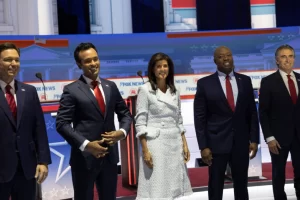
Tim Scott (second from right) was endorsed by SD’s two US senators
In 2016, there were 17 Republican candidates. Five withdrew before the primaries and 11 of the remaining 12 were eliminated in the primaries leaving Trump as the nominee. Only three names appeared on the South Dakota primary ballot that year, Donald Trump, Ted Cruz and John Kasich.
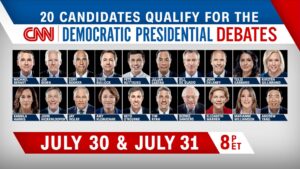
2020 Democrat Candidates
In 2020, there were 29 Democrat candidates for president. Eighteen withdrew before the primaries and 10 of the remaining 11 were eliminated in the primaries, leaving Biden as the nominee. Only two names appeared on the South Dakota primary ballot that year, Joe Biden and Bernie Sanders.
The Field Thins Too Quickly
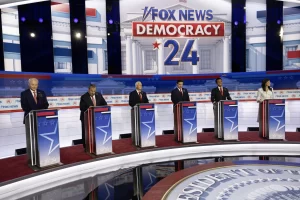
This year there were 13 Republican candidates. Several were intriguing to me. Eight dropped out before the primaries began and 3 more left during the early contests. Only Trump and Nikki Haley were left in the race long before the South Carolina primary.
The presidential primary system swiftly eliminates most candidates long before voters in most states get a chance to voice their opinions. A shortage of money, not qualifications, is often the problem for many who pull out. This is outrageous.
Don’t Blame the Voters
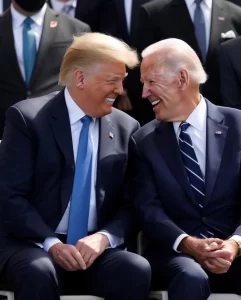
AI generated photo
Numerous Americans express dissatisfaction this year with the prospect of a Biden vs. Trump showdown in November. The existing system frequently fails to yield outcomes desired by voters. Yet, numerous political commentators and so-called “experts” appear to overlook this reality, instead opting to lay blame on the electorate for the predicament. They are unwilling to acknowledge that if we had a primary system that better reflected the wishes of the voters, neither would likely be on the ballot.
Better Alternatives Are Available
If we were to start from scratch today to create a nomination process for political parties to choose their best presidential candidates, it likely would not look at all like what we have today. A new system might treat all voters around the country equally. And it could encourage competition between numerous candidates up until voters get a chance to weigh in. One option is a national primary with all states participating on the same day.
A presidential primary system intended to give voters what they want might even allow them to rank the candidates in order of preference. Ranked choice voting is increasing in use around the US and produces a clear winner who is usually popular with most voters.
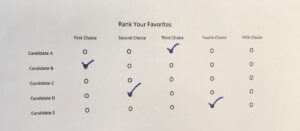
Someday Election Reforms May Arrive
People involved in government and politics tend to resist change. They thrive in today’s systems, so they want to protect the status quo. In spite of those headwinds, meaningful reforms are happening in places like Alaska, Nevada, Idaho and Utah. I remain hopeful we will eventually see logical and democratic election systems throughout the US.
Gene and I had a that conversation the night of the Iowa caucuses.
Thank you for sharing your version.
We agree … and wish we could do more … soon!
Well stated Joe! Our system is certainly antiquated, if not totally outdated. The government “of the people, for the people, and by the people” is now void of most involvement by people at all except ceremoniously. It is now of the money, for the money and by the money!
I totally agree with Joe’s comments and ideas in this section. Our state and entire nation is too often at the mercy of the ultra partisan and big money. Let’s take steps to get back to the idea of one person = one vote; equality for all citizens all taxpayers. We could do much better than the candidates that we are now forced to consider. Let’s have open primaries and eliminate partisan conventions.
Absolutely right! All I want is to choose between something that is NOT liver or spinach
We deserve better candidates to choose from- a National Primary seems like an obvious choice
I think a better solution would be to have the state primaries on the same day across the country so it is all over in one night and all potential candidates have to campaign up until primary night.
As for Alaska;
https://alaskapublic.org/2024/01/18/alaska-house-committee-advances-legislation-to-repeal-ranked-choice-voting/
I hear the AK legislation is DOA if it reaches the senate.